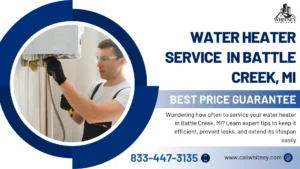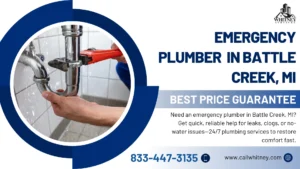Detroit homeowners understand the difference between a reliable hot water supply and daily discomfort. A tankless hot water heater offers energy savings, endless hot water, and a compact footprint, perfect for modern living.
But even the most advanced units need care. If yours starts acting up, recognizing the warning signs early is essential. Delaying action can lead to costly repairs or total failure, especially in Detroit’s hard-water environment and winter chill.
Key Takeaways
- Lukewarm water, fluctuating temperatures, low water pressure, leaks, or unusual noises all signal trouble.
- Detroit’s mineral-heavy water accelerates scale buildup inside tankless heaters, reducing performance and increasing energy costs.
- Minor issues like clogged filters or sediment buildup can quickly become costly if ignored.
- While you can flush the unit or clean inlet filters occasionally, anything involving gas, electrical, or venting systems requires a licensed technician to maintain safety and warranty protection.
- Certified repair experts not only fix visible issues but also check airflow, gas pressure, seals, and sensors, ensuring safe, code-compliant, and energy-efficient operation year-round.
How Tankless Water Heaters Work?
Tankless water heaters heat water on demand using a heat exchanger, activated only when a tap or appliance calls for hot water. In contrast to traditional tank systems, they don’t continuously store water, which eliminates standby heat loss. Their efficiency and compactness make them ideal for Detroit homes.
However, the small internal channels are vulnerable to mineral scale buildup, especially in hard water conditions, common in the region. It is essential to perform annual maintenance, which includes filter replacement and descaling. Ignoring these chores might lead to premature wear, costly repairs, or worse, complete system failure.
Top 8 Warning Signs You Need Tankless Heater Repair
Lukewarm or No Hot Water
One of the most obvious symptoms is a lack of heat. Sediment clogging the heat exchanger or flow sensors can prevent the heater from generating enough warmth. This results in chilly showers and water that never reaches the desired temperature. Typically, increasing the temperature setting won’t solve this—it only masks a deeper issue. Prompt service is essential.
Fluctuating Temperatures (“Cold Water Sandwich”)
One moment your water is steaming hot, and the next surprise, a burst of cold. This traditional “cold water sandwich” happens when the heater inadvertently detects a decrease in temperature or flow. Usually, very fine sediment or malfunctioning sensors cause these abrupt shifts. If this happens, professional diagnostics are the solution, you need to restore sensor accuracy and flow control.
Low Hot Water Pressure
Hot water pressure should be steady. If it weakens or becomes inconsistent, it’s likely due to scale or build-up in the heat exchanger or filters. Since tankless systems have narrower pathways, even slight blockages can lead to considerable pressure loss. Don’t shrug this off, what seems like a minor inconvenience could escalate into a major repair.
Frequent Shutdowns or Error Codes
Modern tankless units include safety sensors to avoid overheating and malfunction. If the system frequently shuts down or displays error codes, it could be due to airflow restriction, blocked venting, or sensor failure. These are urgent safety issues rather than merely annoyances. Professional intervention ensures proper airflow, system recalibration, and safe operation.
Strange Noises (Popping, Rumbling)
Hearing unusual sounds? Popping, cracking, or rumbling noises from the heater almost always point to scale buildup. As mineral deposits heat and break loose, they create noise. This accumulation has the potential to block pathways and lower heating capacity if it is not removed. If you hear anything odd, schedule maintenance to flush the system and prevent damage.
Leaks or Visible Drips
Though rare, leaks from a tankless unit are not to be ignored. These could indicate a valve malfunction, loose connection, or internal seal failure. Water damage and significant water waste can result from even a slight drip. Any sign of leakage means you should call a licensed technician immediately.
Odors or Discolored Water
Rust-colored water or unpleasant smells are red flags. They often point to sediment or internal corrosion contamination. Discolored hot water is particularly concerning because it could affect your skin, laundry, and overall water quality. A professional cleanser and thorough system check can resolve this before more serious issues arise.
Underperforming Appliances
Your tankless heater isn’t just for showers, it powers your dishwasher, laundry machine, and kitchen sink. If these appliances stop heating water effectively, that disruption usually traces back to the heater. While energy efficiency declines, inefficient hot water affects sanitation and detergent performance. This broader impact means it’s time to inspect and repair your heater.
Why Detroit Homeowners Must Act Quickly
Comfort in Cold Winters
Detroit winters are unforgiving. No one wants to wake up to freezing showers or fighting frozen pipes. Tankless heaters already face more demand in cold weather and even a small problem can turn serious fast. Acting fast keeps the heat flowing and ensures peace of mind.
Preserve Energy Efficiency
Tankless systems are lauded for efficiency, but only when running clean and correctly. Mineral deposits and sensor issues make the heater work overtime, bumping up your monthly bills. Timely repair keeps your system operating at peak efficiency, saving you money over time.
Extend System Life & Protect Warranties
A well-maintained tankless heater can easily hit 15–20 years. Skip upkeep, and lifespan shrinks dramatically. Plus, many manufacturers require documented professional servicing to honor warranties, DIY repairs can unintentionally void those protections.
Avoid Expensive Replacements
Repairs usually run in the low hundreds; replacements can cost thousands, including labor, permits, and materials. Early repairs prevent minor faults from turning into full-scale failures, protecting your wallet and avoiding scheduling headaches.
Ensure Safety & Code Compliance
Fuel-burning tankless systems (gas or propane) demand safe venting and installation. Blocked vents, faulty sensors, or worn seals are safety threats. Professionals ensure everything meets local code, avoiding dangers like carbon monoxide or gas leaks.
What a Full Professional Repair Involves
When you call in licensed experts like Whitney Services, here’s a breakdown of the process:
- Decades of Local Experience: Serving Michigan for over 50 years, our team understands Detroit’s specific water and weather challenges. We know what your machine faces all year.
- Fully Licensed & Insured Techs: Every repair comes with certified workmanship and full coverage, meaning no liability for you and adherence to manufacturer warranty guidelines.
- Emergency & Same-Day Service: Don’t tolerate a cold shower. We offer quick response times, even during off-hours, to restore hot water ASAP.
- Transparent Pricing & Flexible Plans: No hidden fees, clear pricing up front, and options like financing or maintenance plans to suit your budget.
- Brand-Agnostic Expertise: Whether it’s Rinnai, Navien, Noritz, Bosch, or any other brand, our technicians are trained to service them all.
- Satisfaction-Driven Guarantee: We stand behind our work. We guarantee to make things right if something isn’t right.
Easy DIY Maintenance Tips (With Caution!)
While major work belongs to professionals, you can still help your system thrive:
- Annually Flush the Heater Yourself: Use a homeowner-friendly descaling kit or vinegar solution. If you notice clouded water or particulates, consider a professional instead.
- Clean Inlet Filters Quarterly: Turn off water, remove filters, rinse them clean, and reinsert. Always follow safety instructions.
- Look for Leaks or Drips Monthly: Water under the unit is a red flag. Turn off the heater and call for help if you find it.
- Monitor & Log Error Codes: Jot down error displays and relay them to pros. The information helps expedite diagnostics and repair.
- Home Softeners Are Worth Considering: If you have hard water, installing a whole-home softener can drastically slow scale buildup, saving you time and money in the long run.
Remember, anything involving gas lines, high voltage, sensors, or venting must be left to trained professionals.
Why Professional Repair Always Wins
- Safety First: Only licensed technicians are trained to handle gas lines, pressure tests, and heat components safely.
- Warranty Protection: DIY repairs often void warranties. Professionals keep records and maintain compliance.
- Comprehensive Diagnosis: Since symptoms are frequently indicators of more serious problems, true experts identify the underlying cause in addition to the symptoms.
- Code Compliance: Professionals ensure installations and repairs follow Detroit municipal codes for safe operations.
- Efficiency Gains: Proper repairs restore efficiency, translating into real savings on energy bills over time.
- System Longevity: Annual professional care keeps your heater performing well for many years.
What to Expect: The Whitney Services Difference
- Local Detroit Expertise: With over 50 years serving Michigan, Whitney Services understands Detroit’s unique water hardness and weather challenges, tailoring repairs to local conditions.
- Licensed, Insured, and Certified Technicians: Every job is handled by qualified professionals who ensure full code compliance, manufacturer-approved repairs, and complete safety for your home.
- Fast, Same-Day Service: Cold showers don’t wait—Whitney Services provides same-day and emergency repairs to restore your comfort quickly.
- Transparent Pricing and Flexible Plans: You’ll always know what to expect upfront. No surprise fees, plus maintenance and financing options to fit your budget.
- Comprehensive Diagnostics & Lasting Results: From descaling and sensor testing to seal inspection and performance analysis, every repair includes a full system check and satisfaction guarantee.
Conclusion
Your tankless water heater is essential for daily comfort, especially in Detroit’s climate. From strange noises and pressure drops to total shutdowns, don’t ignore the warning signs. Taking action early, and calling in the experts, can save you time, money, and stress.
For prompt, dependable, and expert tankless water heater repair in Detroit, rely on Whitney Services. All year long, your system will operate safely and effectively thanks to our local staff, clear pricing, and skilled maintenance.
Frequently Asked Questions
We recommend annual professional maintenance, more frequently if you live in a hard-water area or use the system heavily.
You can clean the intake filter, but if pressure problems persist, you’ll need professional flushing or repairs.
Yes, most repairs cost a few hundred dollars, while full replacements typically range in the thousands.
Most repairs are completed in a few hours. More complex jobs might require parts or additional work, but we’ll inform you before starting.
Major repairs or component access usually void warranties. Pro servicing maintains your coverage and system integrity.
- Complete Flush & Descaling: Technicians attach hoses, pump industrial-grade descaler or vinegar through the system, removing mineral buildup for cleaner flow and better heat transfer.
- Filter Inspection & Replacement: Inlet filters often get clogged first. Technicians clean or replace them to restore flow and prevent future issues.
- Burner & Ignition System Check: For gas units, this includes verifying gas pressure, flame quality, and ignition sensors—which all affect performance and safety.
- Venting & Airflow Inspection: Blocked vents cause overheating. Technicians inspect intake/exhaust, remove obstructions, and correct installation issues to ensure safety.
- Valve Tightening & Seal Inspection: Checking all plumbing connections, valves, and seals for leaks; tightening or replacing as needed.
- Safety Sensor Testing: Flow, temperature, and pressure sensors are verified or recalibrated to ensure proper operation and accurate readings.
- Comprehensive Diagnostic Read: Using diagnostic tools to read error codes, test live temperatures, verify thermostat accuracy, and assess overall system performance.
- Replacement or Upgrade Guidance: If repairs aren’t cost-effective, technicians recommend suitable replacements or upgrades based on your usage, budget, and space.







